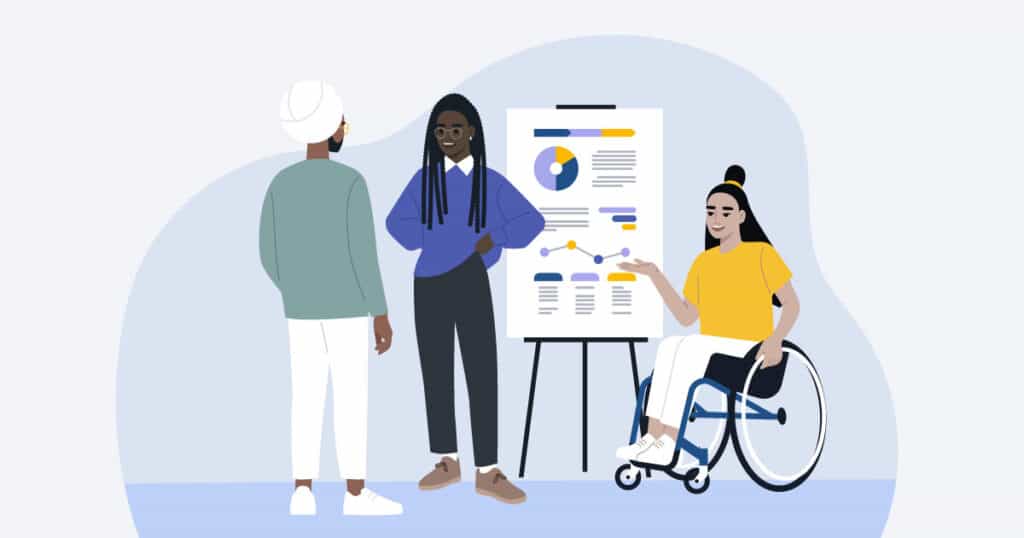Inclusive Communication: A Conversation with Liberty Mutual’s Ray Harrison Novak

Photo credit: iStockphoto.com (nadia_bormotova)
Ray Harrison Novak (he/they) is an Assistant Director of Diversity, Equity & Inclusion at Liberty Mutual Insurance. They spoke with us about obstacles to inclusive communication – including fear of getting it wrong – and the top three skills leaders need to develop cultures that provide safe spaces for all.
Q: “Inclusive communication” is one of those phrases that sounds simple. But in practice, it can be a lot more challenging and nuanced. What is your working definition of inclusive communication?
A: To me, “inclusive communication” means everyone feels that their voice is welcomed and they can trust the people they’re interacting with to engage with them honestly. They are empowered to speak from their own experience, agree or disagree, change their minds, and correct themselves in ways that reaffirm and even strengthen their relationships.
It can be challenging to practice effectively for any number of reasons: our unconscious biases, the pace of business, etc. Maybe you get feedback that you’re not coming across in the way you intended to. Or you feel like you have to repeat yourself, or you’re just spinning your wheels. It’s frustrating and can feel counterintuitive to slow down… even though doing so will help you get farther faster and help everyone win.
Q: When it comes to inclusive communication, many people are concerned they will make mistakes – for example, inadvertently say something others will find racist, homophobic, or anti-trans – even if they are people who sincerely try to learn about others. What would you recommend to them?
A: Learning about others is one way to learn while learning from others is another. Everyone is an expert in their lived experience, how they see the world, and what impacts them. Listening to how others share their experience can guide you. If someone is comfortable enough around you to share their experience openly, that’s a gift. Absorb it!
I’m a big believer in relationships – the world is complicated, uncertain, and rapidly evolving, so we need to work together to navigate it. We can do great things together. And there’s this paradox: the closer and more authentic we are in our relationships, the more likely we are to make mistakes. Prioritizing your relationships over your fears allows you to take accountability for your mistakes, practice being more inclusive, and strengthen others’ trust.
Q: Inclusive communication aims to create a safe space for all – and workplaces that work for all. What are the top three skills that help leaders achieve this?
A: Depending on their day-to-day responsibilities, leaders can be at risk of showing up very strong on organizational issues and, at the same time, less practiced or present on personal or interpersonal issues. It’s worth the investment to improve your interpersonal or “soft skills.”
Inclusive communication can feel slow for more pace-setting leaders, but with increasing automation and the rise of AI, “soft skills” are increasingly valuable. And the benefits of doing them well are well-documented: higher levels of employee engagement, increased innovation, and stronger business results.
Listening to understand is a skill I’m working on. It can be challenging to grow this skill in a role where you must influence efficiently, but it’s key for building sustainable and mutually beneficial relationships.
Suppose you invest in your interpersonal skills and listen to understand. In that case, you may start to receive more honest feedback: about what’s going on in your organization, what others are dealing with, and even about the impact you’re having on others. Again, that’s a gift – and it can be hard to hear upfront! If what you hear brings up a lot of stress and stressful feelings, it’s the perfect time to practice a growth mindset. What can you learn from this information? What can you learn about yourself based on the feelings that come up? What can you try doing or do differently?
Being present and aware doesn’t mean you won’t feel discomfort or experience disagreement. It’s OK to disagree, and you can do so respectfully. It’s never OK to blame, shame, or attack (yourself or) others. The higher the stakes, the harder it is to do.
The magic is when people bring all these skills together: they disagree while maintaining a growth mindset, staying open to all possibilities, and listening to understand the experience of others. They gain a lot from the process: stronger, more honest relationships, more effective outcomes, and a sense of psychological safety for everyone.
Q: Liberty Mutual has an Inclusion in Action program you’ve been involved in. What are some key takeaways from this program that might help people who do this work in other organizations?
A: This was one of my favorite programs to develop at Liberty Mutual! The program teaches nine skills to help people communicate and collaborate more effectively across differences through entertaining video scenarios. And by entertaining, I mean we were inspired by contemporary TV shows. We also lived by these nine skills when writing, filming, and producing the program, so it’s a great example of the level of innovation that can be gained by applying the skills themselves.
The program might seem like it’s purely about inclusive communication skills… but once we deployed it and as people strengthened their skillsets, we could see how this helped not just to spark innovation and better ways of collaborating but also to manage quite challenging experiences – from taking accountability for mistakes to navigating change or painful current events. In an increasingly complex and polarized world, employees need these tools to be effective. It just can’t be automated.
After deploying this to all employees and integrating these skills across the entire company, we knew that making this publicly available was aligned with Liberty’s values. We do not receive any of the proceeds – they go to a non-profit in the Boston community, More Than Words, that empowers at-risk youth by developing the skills to run a business.
Q: You’ve also been involved in the Men as Allies initiative. What have you learned helps more men get involved in advancing women – and diversity, equity, and inclusion more generally – in the workplace?
A: I’m proud of the work we’ve been doing with Men as Allies. We started in 2015 with listening sessions: listening to understand what some of the perceptions of DEI across our male population were. While the themes were not unusual, they were distilled down to feelings of fear and uncertainty. But when other men talked about their stories of inclusion and feeling like they belonged, that fear and uncertainty melted away – because now there was a role model, someone they could relate to.
Where helpful, I’ll share what I call my “inside/outside” experience: I was born female and socialized as a girl, even attended a historically women’s college where my major was essentially gender studies. I felt very in the middle (though I identify as non-binary), and the incongruity reached a point where I had to transition gender – and my only other option at the time was male. Once I transitioned, I was consistently perceived as male, and it was like a whole different world opened to me. It was a visceral realization that most men would not have a clue about the lived experience of women – the world I came from.
And how could they? In our culture, gender is still viewed as binary and reinforced in binary ways. So, if you never have to question your gender or how it’s reinforced, you take it for granted. It’s the air you breathe or the water you swim in; it feels normal because it’s become wallpaper. Men who can see even a sliver of that wallpaper need to talk to other men about what they see because awareness is the first step to showing up differently.
And all men have a personal stake in DEI and gender equity – because men cover aspects of their identities in the workplace for as many diverse reasons as any other group. Men willing to talk to other men honestly about this are practicing courage, and I hope my lived experience inspires men speaking to this as much as they inspire me.

Ray Harrison Novak (he/they) is an Assistant Director of Diversity, Equity & Inclusion at Liberty Mutual Insurance. Ray is passionate about bringing people together through innovative and effective learning experiences. These include the Telly-award winning Inclusion in Action program and Liberty Mutual’s Men as Allies initiative.